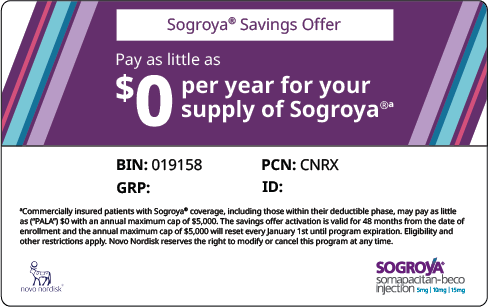- you have a critical illness caused by certain types of heart or stomach surgery, trauma or breathing problems
- you have cancer or other tumors
- you are allergic to somapacitan-beco or any of the ingredients in Sogroya®
- your healthcare provider tells you that you have certain types of eye problems caused by diabetes
- you are a child with closed bone growth plates
- you are a child with Prader-Willi syndrome who is severely obese or has breathing problems including sleep apnea (briefly stopping breathing during sleep)

Your savings and support resource for Sogroya®
You’ve come to the right place to find coverage and cost information, as well as a savings offer that may help lower your out-of-pocket costs.
Interested in personalized support and information during therapy? NovoCare® offers both with a dedicated Case Manager. Learn how the program works below.

Your savings and support resource for Sogroya®
You’ve come to the right place to find coverage and cost information, as well as a savings offer that may help lower your out-of-pocket costs.
Interested in personalized support and information during therapy? NovoCare® offers both with a dedicated Case Manager. Learn how the program works below.

Find out if your insurance covers Sogroya®
Complete a quick form to check your insurance coverage in minutes and, in many cases, learn what your cost will be.

The insurance process, simplified
How it works
NovoCare® can help you navigate the insurance process by:
- Working with your insurance company to learn if the prescribed drug is covered
- Sharing Prior Authorization forms and submission process information with the health care provider
- Following up to find out whether or not coverage was provided
NovoCare® also assists with next steps—depending on the outcome.
If approved
If insurance coverage is approved, NovoCare® will:
- Coordinate relevant information between the health care provider and a specialty pharmacy that carries the prescribed growth hormone (GH) therapy
- Determine if the patient is eligible to save money on prescriptions through the NovoCare® Savings Offer
If denied
If insurance coverage is denied, NovoCare® will:
- Provide eligible families with information about the multi-step appeal processa
- Determine whether the patient is eligible to enroll in the Patient Assistance Program for their medicine
aAppeal support is available for patients prescribed a Novo Nordisk product for a diagnosis that is an FDA-approved indication.
Save on your medication
If you have commercial insurance, such as insurance you receive through an employer or purchase yourself, you may be eligible for savings on your Sogroya® medicine.
Request copay savings today.

Our commitment to affordability
If you have commercial insurance
Fill in the gaps with JumpStart™
If you’re experiencing a gap or delay in insurance coverage, you may be eligible for JumpStart™—a program that provides a limited supply of free Sogroya® to those who qualify.
Call 1-888-668-6444 to see if you qualify.
If you have no insurance
Get free medication through the Patient Assistance Program (PAP)
Lack of insurance coverage and limited financial means shouldn’t prevent you from getting the treatment you need. You may be eligible to receive Sogroya® free of charge.
Request a starter kit
The Patient Starter Kit contains support materials to help patients initiate therapy.
Provided exclusively through NovoCare® upon request.
To request a starter kit, call 1‑888‑668‑6444.
NovoCare® provides personalized support and information during therapy
A dedicated Case Manager is ready to help. Call NovoCare® at 1‑888‑668‑6444 Monday‑Friday, 8:00 am‑8:00 pm ET.
How the NovoCare® program works:
01
Enrollment
An enrollment form, containing a prescription, will be sent from your health care provider’s office to NovoCare®.
02
Welcome call
Once the prescription is received by NovoCare®, a dedicated Case Manager will reach out to you.
03
Insurance coverage and costs
The next step is to provide you with information about your insurance coverage and potential out-of-pocket costs. You can ask us about the Savings Offer (for eligible patients).
04
Specialty pharmacy shipment
Once the insurance company approves the prescription, NovoCare® will send it to a specialty pharmacy. They will reach out to you to schedule the shipment. A prompt call back to the pharmacy will help ensure a timely shipment of your product. You’ll also receive your starter kit, if requested.
05
Device training
As you prepare for your first shipment, your Case Manager will reach out to you to provide you with the opportunity to schedule an in-person or virtual training to ensure you’re comfortable with the pen and injection process.
06
Follow-up
NovoCare® will continue to be available to assist you with non-clinical product questions and support you during your therapy.
Call NovoCare® at 1‑888‑668‑6444 Monday‑Friday, 8:00 am‑8:00 pm ET.

